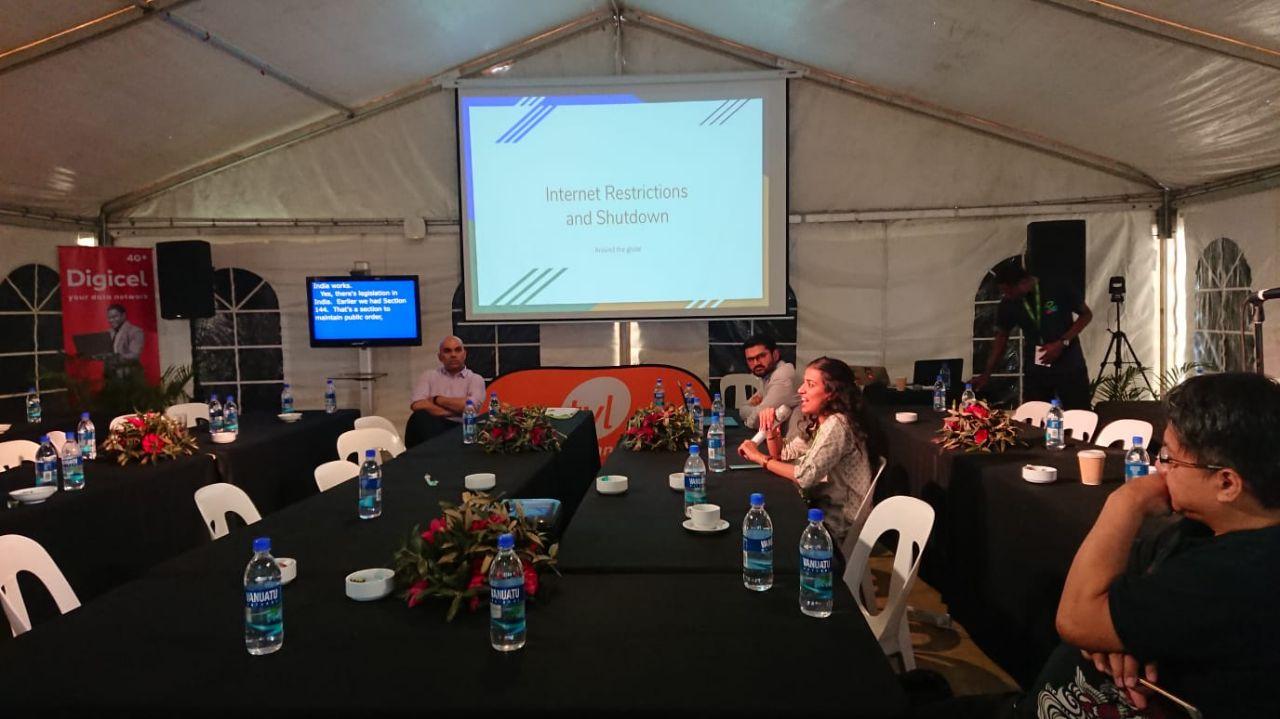The Asia Pacific Regional Internet Governance Forum (APrIGF), 2018 was held in Port Vila, Vanuatu from 13th to 16th August.
Each year, the APrIGF serves as a multistakeholder platform for discussion, exchange and collaboration at a regional level and also where possible, to aggregate national IGF discussions that ultimately advance the Internet governance development in the Asia Pacific region.
This year, on the Day 3, 16th August 2018 Mr. Maheeshwara Kirindigoda (ISOC Sri Lanka) organized a panel discussion titled “Internet Restrictions in Asia Pacific Region and How to Mitigate.” The Panel constituted Mr. Maheeshwara Kirindigoda (ISOC Sri Lanka), Mr. Waqas Hassan (PTA, ISOC Islamabad), Mr. Shreedeep Rayamajhi (ICANN, ICT4D, Rayznews) and Ms. Tripti Jain (SFLC.in). The discussion was moderated by Mr. Rajnesh Singh (APrIGF, ISOC Asia Pacific)
The panelists for the session focused on three main issues:
-
How Internet Restrictions or Shutdowns have become a Global concern?;
-
Why is the Government resorting to the idea of Internet Shutdown; and
-
What are the effective ways to mitigate the issues/reasons for shutdowns instead of resorting to such shutdowns?
Mr. Rajnesh Singh began with an introduction to the issue of Internet restrictions or shutdowns and how these order for bans affect people globally. He then went on to cite various instances of shutdowns across the globe highlighting concerns arising from these impositions. He also brought to notice that Access to Information & Communication Technology is a Human Right, sanctioned through ITU by United Nations. In this sense, Internet shutdown result in a denial of human rights.
Tripti Jain (SFLC.in) shared experiences from India with respect to Internet Shutdowns. She emphasized that India has seen the highest number of Internet Shutdowns in the world. She then mentioned that SFLC.in has been recording shutdowns since 2012. SFLC.in has recorded 375 instances of Internet shutdowns so far on their tracker, located at https://internetshutdowns.in/. She then highlighted that the numbers from their tracker may not be accurate because it is based primarily on information from secondary sources, i.e newspapers and reports from individuals. Therefore, the tracker fails to take into account many unreported instances of Internet shutdowns. She also discussed the failure of government and the private sector to record and report report instances of Internet Shutdowns in India. She mentioned SFLC.in’s research and stated that we have filed an RTI (Right to Information Application) this summer to the Home Department of Rajasthan (a large state in India) as a result of which we found that there have been over 26 instances of Internet Shutdowns in 8 months that were not reported by newspapers. She discussed the procedural and executive concerns regarding legal provisions to impose Internet Shutdowns in India.
Mr Waqas Hassan discussed about the scenario in Pakistan with respect to Internet Shutdowns/ Restrictions. Mr. Hassan was representing the Government on the Panel and from his experience, he stated that one must always amicably engage with the government in order to reach a desired consensus. He also highlighted that over the years Pakistan has seen positive changes and that there has been a considerable decrease in the number of shutdowns ordered, however there’s still a long way to go. While talking about restrictions on the Internet, he mentioned about the Judicial stances during the times of spread of misinformation.
Mr. Maheeshwara dealt with concerns of Sri Lanka along with the rest of the world with respect to the issue of Internet restrictions. He emphasized upon the reasons behind such orders. He cited various occasions on which Internet shutdowns were imposed across various parts of the world. He identified that Governments across the world have claimed national security as the primary reason to impose Internet shutdowns. He also discussed how most shutdowns are politically driven.
Mr. Shreedeep discussed his concerns with increasing number of Internet shutdowns in India and across the globe. He also stressed upon the economic impact of these shutdowns.
Key Takeaways:
-
Internet Shutdowns have become a global concern in today’s digital age with a rapidly rising number of shutdowns across various nations.
-
Governments of the world often claim national security as the primary reason to push the kill switch, however in various nations including India, Internet shutdowns are often ordered for frivolous reasons such as prevention of cheating during examinations.
-
It has also been observed that Internet Service Providers and websites often attempt to notify their users before restricting access for maintenance of their networks. However, when Governments order shutdowns, there is often no prior notice.
-
The ripple effects of orders to impose an Internet shutdown are very severe. It leads to economic loss, lives are at risk during riots and disasters, it hampers education and affects healthcare, and the ability to exercise one’s rights such as free speech is hampered, among others.
-
There is a need to study the effectiveness of Internet Shutdowns to ensure national security viz-a-viz economic loss ensued by the state in the process.


